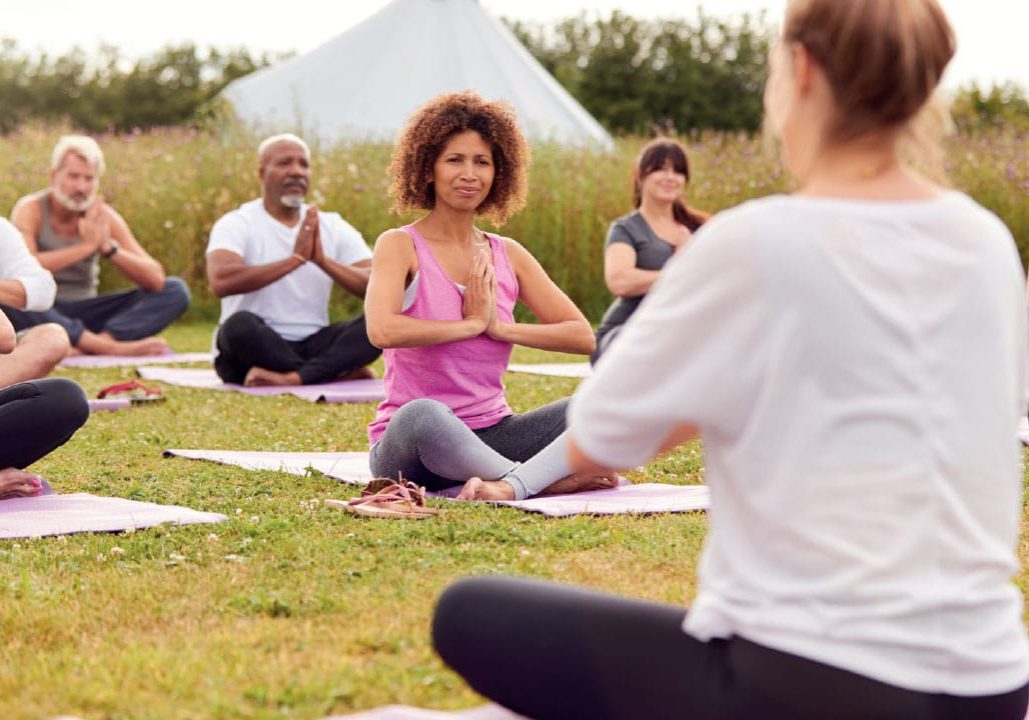The notion of toxic positivity and its negative effects on mental health has long occupied the wellness arena, but toxic gratitude is a closely related problematic concept that has lately permeated the yoga community.
Toxic gratitude, or gratitude shaming, is defined as “the act of criticising others for feeling negative emotions while lacking gratitude that the perpetrator believes [are warranted]” (White, 2022). Countless scientific studies have proven that genuine gratitude has a plethora of health benefits. However, like positivity, forced gratitude has the potential to become a toxic catchall unintentionally weaponised against victims of trauma and mental illness. This is why we as yoga teachers must be careful not to push this emotion onto our yoga practitioners, especially if we are not aware of their backgrounds.
In a recent article in a popular US magazine, the author listed mantras, affirmations and pieces of advice that her yoga teachers had offered during classes throughout that year that resonated with her. Many of these phrases such as “be kind to yourself without comparison to others” and “it’s okay to have a bad day and not judge yourself for it” are empowering and inspirational.
Other phrases that were clearly intended to be just as helpful unwittingly contained trauma-triggering components. Two of these common and potentially trauma[1]triggering phrases, uttered by many well intended yoga teachers and contained in the aforementioned article, are addressed below.
Triggering phrase #1
The first is: “Notice when you are being selfish and replace it with gratitude.” Through a trauma-informed lens, this phrase suggests that one should not express, process, or even have any negative emotions, lest they be deemed selfish. It implies that practitioners should take the cliched attitude of believing someone else always has it worse, and it savours of an effort to either “one up” someone else’s trauma or minimise one’s own. Comparing our experience with another person’s or invalidating our own experience is not the objective of yoga, and is actually an extremely traumatising exercise.
It is okay to not always be grateful for everything that has happened to us. According to Maté (2022), forced or unwarranted gratitude, or minimising one’s own trauma through the rationale that others have been through something worse, directly equates to a lack of self-compassion, and most yoga teachers would agree that a lack of self-compassion is anything but yogic.
Moreover, to casually tell potential trauma victims to simply find gratitude in their experiences, without knowing what their exact experiences have been, risks being construed as minimising, gaslighting and victim blaming. This message minimises a survivor’s trauma and dismisses their valid and proportionate reaction to what they experienced. It also exacerbates the tendency of trauma survivors to believe that they deserved or caused what happened to them (Foo, 2022).
In fact, according to Maté (2022), encouraging trauma survivors to suppress “negative” emotions — such as anger — associated with their traumatic experience creates a physiologically toxic experience for them, causing them to constantly relive the felt sense of lack of safety in their own body. White (2022) echoes that "when we use gratitude as a smokescreen, we fail to hear what our emotions need to say. Suppressing our feelings will only lead to more stress and increase risk for a host of mental health issues."
While many trauma survivors will admit that the trauma resulted in them developing certain strengths and abilities, trauma survivors should never be asked to be grateful for the traumatic experience. We can acknowledge the trauma’s role in the developed strengths and abilities — naming them first and foremost as trauma responses and not mistaking them for personality traits (Maté, 2022) — while at the same time never asking victims to direct a sense of gratitude toward the traumatic experience itself (Foo, 2022). Victims who acknowledge trauma’s role in their development of such so-called strengths are usually also very emphatic about the fact that they never wanted to necessitate developing those traits (Foo 2022; Van der Kolk, 2014). Instead, we as yoga teachers must send practitioners the message that their reactions and emotions are proportionate to what happened to them, hold space for those emotions to process without becoming exacerbated during yoga practice, and most importantly, send the clear message that “we don’t need to find gratitude in every experience” (Byham, 2022).

Triggering phrase #2
The second problematic mantra in question is: “If something in your life isn’t serving you, thank it for the lesson and let [it] go.” It is correct and helpful for yoga teachers to skilfully encourage their students to safely process and release what is not serving them. However, for trauma survivors, thanking an unwanted, harmful experience for its lesson can quickly become problematic and manifest as forced, toxic gratitude. In fact, it strongly resembles the well-intended, yet potentially toxic phrase, “everything happens for a reason.”
If we utter such phrases as class themes, our yoga students will be led to believe there is something wrong with them if they cannot find something for which to be grateful within their own trauma response or mental illness, and this is not a helpful way to approach them. Our message to them should instead be that sometimes, there is no need for a lesson to be found and “finding meaning in life beyond trauma is not the same as saying everything happens for a reason, which can be quite harmful” (Schwartz, 2023).
According to Maté (2022), the nervous system cannot discern the difference between what we would categorise as “big or small ’t’ trauma.” Thus, no one else can judge how another person’s traumatic experience may have landed on them or to what extent they are prepared to have their attention drawn to it.
It is paramount that yoga — one of the only places these survivors can go for comfort, safety, and healing — does not inadvertently perpetuate their symptoms. Experts in trauma-informed yoga maintain that the last thing we should do is make trauma survivors think or talk about their trauma before they are ready, much less relive it in a quest for a lesson or gratitude. It is clear, according to experts in trauma and trauma-informed yoga (Maté, 2022; Schwartz, 2023), that guilt and shame[1]inducing techniques are not the correct way to approach trauma survivors, who hear all too often that they are overreacting or that their valid and proportionate reaction to traumatic event(s) is “too much" for those around them. In fact, for complex PTSD survivors, self-loathing, lack of self-compassion, shame, and self-sabotage are often conditions that already plague their existence and do not need to be exacerbated (Foo, 2022).
The message that everything contains a lesson or happens for a reason has the potential to cause major doubts around self-worth for individuals who have been through difficult life situations or have been systemically disadvantaged, making them feel as though they somehow deserved their circumstances.
Asking practitioners to find a lesson within their trauma or hardship does not support healing and is not a trauma-informed practice. It is not the internal work of the survivor to analyse the trauma. Byham (2022) reiterates that “we don’t have to learn a lesson through trauma. We can [instead find healing through] accept[ing] that it was something that should never have happened. Finding no lesson or gratitude in the experience doesn’t prevent […] healing” but rather supports healing.
Good intentions
In summary, the two well-intended utterances discussed above on the part of a yoga teacher may be helpful to some practitioners who have experienced little to no trauma. However, for trauma survivors, they can quickly transform into toxic gratitude and an unnecessary reliving of traumatic experiences.
As an alternative, yoga teachers could share with their students themes and affirmations similar to those as follows, offered by author and trauma survivor, Emma Rose Byham: “I will not pressure myself. I will not rush myself. I will listen to my body. I will rest when I need to. I will hold space for [myself]. I will accept myself as I am now, in this moment.”
According to Byham (2022), “you can make room for growth and at the same time not pressure yourself, not hold yourself to unobtainable expectations.” Let this also be our message to our yoga students as we work to refine our well-intended mantras and affirmations to meet the needs of all trauma survivors who enter our yoga studios.
References
- Apigian (2023-present). The biology of trauma. [Audio podcast].
- Arasu, A. (2023, May 21). Balancing hormones for trauma healing [Conference session].
- Reset Super Conference. https://www. consciouslife.com/conferences/reset/agenda
- Byham, E. (2022). Was it even abuse? Emma Rose Byham.
- Foo, S. (2022). What my bones know: A memoir of healing from complex trauma. Ballantine
Books
- Harris, D. (2023, April 19). Modern life is making you sick, but it doesn’t have to (No. 586) [Audio podcast]. In Ten percent happier.
- Howard, A. (2023). Decode your trauma. [Workshop].
- Maté, G. (2022). The myth of normal: Trauma, healing, and illness in a toxic culture. Avery.
- Schwartz, A. (2022). Therapeutic yoga for trauma recovery. Pesi Publishing Inc.
- Schwartz, A. (2023). Healing intergenerational trauma. [Workshop].
- Van der Kolk, B. (2014). The body keeps the score. Penguin Books.
- White, A. (2022). Gratitude, its benefits, toxic positivity, and how to feel grateful in hard times. https://wechope.org/living-with-rb/ gratitude-benefits-toxic-positivity-and-how[1]to-feel-grateful-in-hard-times/






